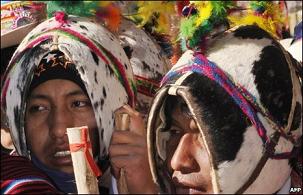The Global Aluminium Industry, Environmental Impacts, Indigenous Peoples’ Rights

While global demand for the world’s most popular metal – aluminium – continues to rise, it is critical that the aluminium industry address its environmental and social impacts, particularly in indigenous peoples’ territories, according to new report published today by Asia Indigenous Peoples Pact (AIPP), Forest Peoples Programme (FFP) and International Union for Conservation of Nature (IUCN).
With many of the world’s bauxite mines, and the rivers used to generate power for its processing, located in or near indigenous peoples’ territories, the aluminium industry needs to ensure the rights of indigenous peoples are respected and protected, as outlined in the UN Declaration of on the Rights of Indigenous Peoples, said the authors, who are participating in the UN Business and Human Rights Forum taking place here from 16-18 November.
The report, Mining, the Aluminium Industry and Indigenous Peoples: Enhancing Corporate Respect for Indigenous Peoples’ Rights, provides a global overview of the challenges facing indigenous peoples, and presents five case studies from Australia, Cambodia, Guinea, India and Suriname. The case studies reveal that indigenous communities are affected by primary production activities, such as mining and associated infrastructure (Australia, India, Guinea, Suriname), and by secondary processes such as smelting and energy production used to sustain operations (India, Suriname).
FFP Director Joji Cariño added:
“As many indigenous territories are located in areas of rich biodiversity and natural resources, governments have often neglected indigenous peoples’ rights in the name of externally defined ‘national interest’, which makes the ASI’s inclusion of a requirement to obtain the consent of indigenous peoples particularly welcome. Going forward, governments must create a more secure, enabling environment that supports the right of indigenous peoples to self-determined development, including full control over sub-soil resources and full participation in any discussions regarding the development of such resources.”
For more information or to set up interviews, please contact:
Geneva:
Helen Tugendhat, Policy Advisor, FPP – Tel: 07551 493783, Email: [email protected]
Prabindra Shakya, Coordinator of the Human Rights Programme, AIPP – Email: [email protected]
Global:
Joan Carling, Secretary General, AIPP – Tel: +66 5338 0168, Email: [email protected]
James Harvey, Communications Manager, FPP – Email: [email protected]
To download the report, click here.
Funded by the Aluminium Stewardship Initiative (ASI), the report is one of the main outcomes of an Indigenous Peoples’ Expert Meeting on the ASI Performance Standard, held in Chiang Mai, Thailand, in August 2015, where participants recommended publishing their experiences with the aluminium industry, along with guidance on FPIC and the identification of indigenous peoples.
ASI was launched in 2012 by key players in the aluminium industry. For two years until August 2015, IUCN served as a coordinator of a multi-stakeholder process that involved representatives from industry and NGOs, including FFP, and led to the creation of the first ASI Performance Standard. ASI is now an independent organisation. For more information, see: www.aluminium-stewardship.org
About Asia Indigenous Peoples Pact (AIPP)
AIPP is a regional organization founded in 1988 by indigenous peoples’ movements and is committed to the cause of promoting and defending indigenous peoples’ rights and human rights and articulating issues of relevance to indigenous peoples. AIPP has 47 members from 14 countries in Asia with 14 National Formations, 15 Sub-national Formations and 18 Local Formations. Of this number, six are Indigenous Women’s Organizations and four are Indigenous Youth Organizations.
About Forest Peoples Programme (FPP)
FPP was founded in 1990 in response to the forest crisis, specifically to support indigenous forest peoples’ struggles to defend their lands and livelihoods. FPP supports the rights of peoples who live in forests and depend on them for their livelihoods and works to create political space for forest peoples to secure their rights, control their lands and decide their own futures.

